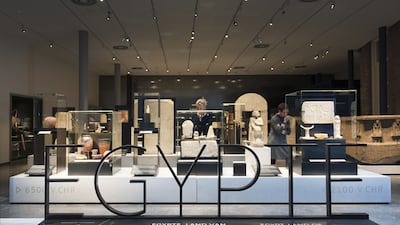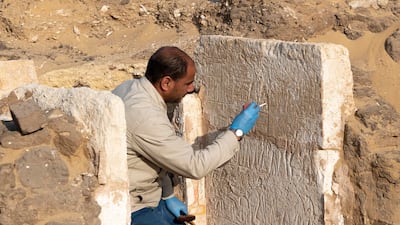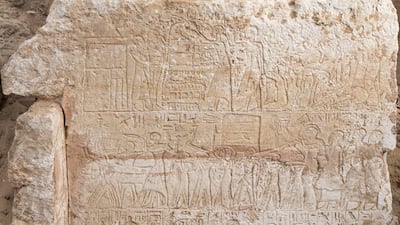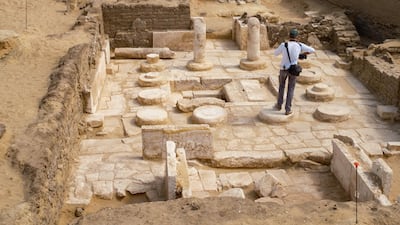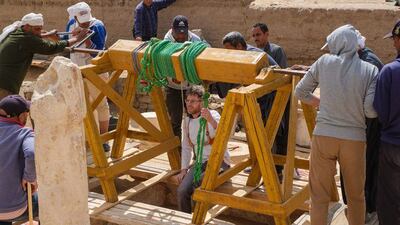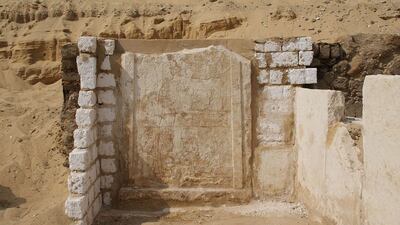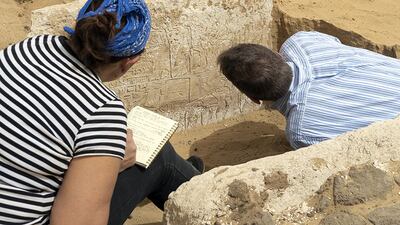The director of the Leiden National Museum of Antiquities in the Netherlands is hoping to change the Egyptian government’s position on a recent ban on the museum’s excavations in Cairo’s Saqqara necropolis.
Wim Weijland is meeting an Egyptian delegation at an Egyptology conference hosted in the city in August, Selkit Verberk, a media representative from the museum, told The National.
The Egyptian government revoked the museum’s excavation licence in Saqqara after an exhibition titled “Kemet: Egypt in Hip-Hop, Jazz, Soul & Funk”, which highlights the prominence of ancient Egyptian culture and its influence on music genres made famous by musicians of African descent, on the grounds that the exhibition was “falsifying the ancient Egyptian history”, Ms Verberk said.
Egypt has not announced the ban yet, but it was confirmed by the museum itself.
Mostafa Waziri, the secretary general of Egypt's Supreme Council of Antiquities, who oversees excavations at Saqqara, did not respond to The National's request for comment.
The exhibition, which features images of Beyonce and Rihanna dressed in ancient Egyptian garb in addition to music videos, audio clips, concert recordings, photographs and album covers by musicians with a connection to ancient Egypt, opened after a controversial “afrocentric” portrayal of Egypt’s Queen Cleopatra in a Netflix docu-drama.
The series resulted in several lawsuits being filed against its creators and Netflix on the grounds of "falsifying history".
The museum has been conducting excavations and research in Saqqara, a prolific ancient Egyptian burial site near the Pyramids of Giza, since 1975.
“The Egyptian authorities have every right to terminate a permit for an excavation; after all, it is their land and their heritage,” Ms Verberk said, “The Dutch National Museum of Antiquities is understandably disappointed that after almost 50 years, the museum is no longer allowed to excavate in Saqqara.
The museum wants to discuss the ban with the Egyptian side, which has not yet seen the exhibit, according to Ms Verberk. She says that the aim of the exhibition was to “show and understand the depiction of ancient Egypt and the messages in music by black artists”, and to “show what scientific, Egyptological research can tell us about ancient Egypt and Nubia”.
“The museum is surprised that this argument of ‘falsification of history’ is being made to ban our excavations at Saqqara, by people who have not actually seen the exhibition,” Ms Verberk added.
“At the beginning of August, a large international Egyptology congress will be organised by Leiden University. On that occasion, the director and curator of the museum hope to have a meeting with the Egyptian colleagues, and specifically hope that these colleagues will visit the exhibition.”
After the exhibition’s launch, many criticised the Leiden National Museum of Antiquities on social media over the portrayal of ancient Egyptians as being dark skinned.
The museum added a note to the exhibition’s website outlining its goals for holding the exhibit and warning that any offensive or racist comments would be removed from its pages.
Afrocentrism is an approach to studying world history that aims to highlight the role of black Africans in the shaping of humanity’s narrative, which supporters of the movement say has been played down because of racist academic traditions inherited from Europe.
It has long been a point of contention among Egyptians who argue that while black Africans were part of ancient Egyptian society, the movement’s estimation of their role is largely overexaggerated.
The movement has been repeatedly criticised by prominent Egyptologists, including Zahi Hawass and Mr Waziri.
